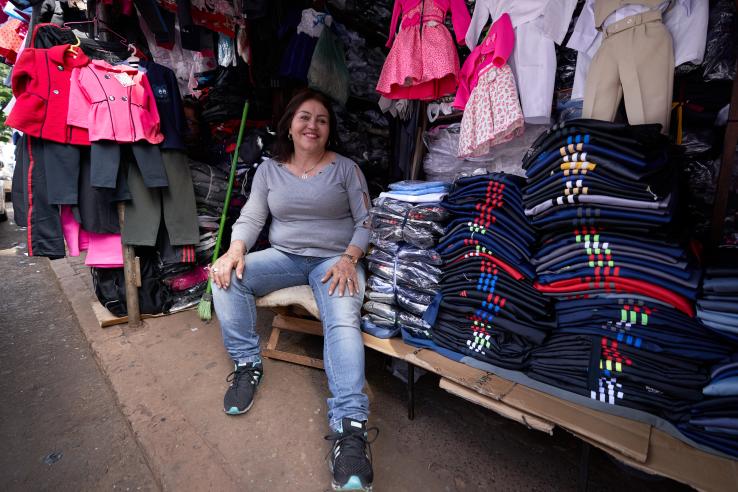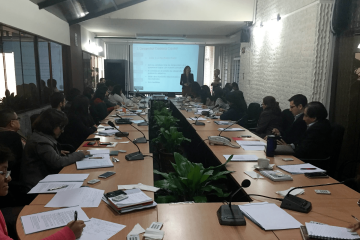
Evidence-informed strategies to support female microentrepreneurs in Latin America and the Caribbean

One in three female workers in Latin America and the Caribbean (LAC) are self-employed. Surveys in eight countries across the region showed that about fifty percent of firms with five or less employees—micro firms— are run by women. These numbers demonstrate how important women are to the workforce in LAC.
Micro and small firms are also key and serve as the predominant form of economic activity in low and middle-income countries. Despite this, there is a significant gender gap in business performance. When compared to businesses run by men, female-owned firms are smaller in terms of employees, sales, costs, and physical capital. Additionally, women face more challenges in growing their micro-firms into small and medium-sized businesses.
Female microentrepreneurs encounter numerous unique barriers to running successful businesses that can vary across countries. Households’ responsibilities and social norms related to chores at home could be some obstacles. For example, a survey from Mexico in 2002 examining micro-firms found that, on average, women entrepreneurs devoted about 25 percent fewer hours to their business relative to male microentrepreneurs, potentially due to family or household obligations. In Bolivia, another survey from the World Bank in 2007 found that 71 percent of female business owners perceived family obligations or household chores as an obstacle to their firm’s operation and growth and were 14 percent less likely to have taken part in any business training than men. Further still, a survey from the World Bank in 2008 focused on Peru did not find meaningful differences between female and male entrepreneurs regarding schooling and hours devoted to the business.
Emerging evidence on skills training
One approach to helping female microentrepreneurs overcome these challenges is business training. However, training women in standard management practices may be insufficient to make their businesses grow if they face additional barriers like economic constraints and rigid social norms. There is limited evidence on how the impacts of alternative business training models vary for women, and the studies that examine the impact by gender find mixed results. However, a growing body of literature suggests that alternative training programs that are delivered one-on-one, tailored to participants’ needs, teach easy-to-apply skills, or foster entrepreneurial mindsets may be more effective than those delivering more traditional curricula. Therefore, it is worth checking whether alternatives to the traditional business training models are better suited to address female entrepreneurs' needs.
As part of J-PAL LAC series blog series launched this past International Women’s Day, we are outlining lessons for policymakers from randomized evaluations of three promising programs conducted in countries across LAC that address the gender gap in business performance.
The promise of alternative training in LAC
One alternative model of training is heuristics, or rule-of-thumb, training, which aims to simplify standard business training into a set of routines that can be more easily understood. Rather than trying to teach accounting, for example, such training focuses on basic financial principles like keeping household and business money in two separate drawers. This type of approach holds appeal for training the smallest businesses and business owners lacking formal education in these areas of need.
Heuristic training in the Dominican Republic
The first example of Heuristic training we present was a study conducted in the Dominican Republic. Researchers conducted a randomized evaluation and found that a rule-of-thumb financial training, in which nearly all participants were women, was indeed more effective than standard accounting training in improving business’ best practices among microentrepreneurs with incomplete high school education or without previous financial training.
Heuristic training in Ecuador
Similarly, in Ecuador, a rule-of-thumb financial training increased daily profits and sales, particularly among female microentrepreneurs and people experiencing more stressors and things to keep in mind, such as taking care of children or house duties. While evidence on the long-lasting effects of heuristics training is in its initial stages, this simplified training model shows promise in supporting the most vulnerable microentrepreneurs.
Role models training in Chile
Lastly, J-PAL affiliated professors Jeanne Lafortune and José Tessada, together with Julio Riutort, evaluated another alternative training model in Chile, where over 90 percent of the participants were women. The researchers incorporated role models or personalized advice into standard training programs, including testimonial sharing from previous participants of a traditional training program who became successful microentrepreneurs. The study found that Role models increased confidence among less experienced participants and were more cost-efficient than technical assistance. Role models helped to increase participants’ aspirations in addition to confidence.
These alternative and personalized training programs are promising paths to improve management among female microentrepreneurs, but it is still necessary to conduct more research on them. Although they were implemented in three different countries of LAC, they are experiences that could be adapted and piloted across the region if we understand what drives their results.
Designing programs tailored to female entrepreneurs’ needs
Alternative business training programs that are tailored to participants’ needs, teach easy-to-apply skills, or go beyond traditional curricula to foster entrepreneurial mindsets could be an effective solution to mitigate the gender gap in business management and, as a result, the income gap.
J-PAL has two initiatives that could address this issue by funding and supporting the generation of rigorous policy-relevant research in LAC:
- The Jobs and Opportunity Initiative (JOI), expanded in 2021 to Brazil as JOI Brazil, will provide targeted funding to test the most promising innovations addressing pressing employment challenges in Brazil. JOI Brazil will then disseminate the knowledge created to governments, civil society organizations, the private sector, as well as foundations in the country. The initiative will prioritize gender as a cross-cutting issue throughout its research topics.
- The Gender and Economic Agency Initiative also funds randomized evaluations of strategies to enhance women’s economic agency. A priority theme is enhancing women’s labor potential and work readiness.
If your organization is implementing or planning to implement projects focused on alleviating the gender management gap or strategies to enhance women’s economic agency contact us at [email protected]
This blog post is part of a blog series commemorating International Women’s Day. Register here for receiving a notice when new pieces are published. You can also check the first and third blog posts of the series. We want to thank Daniela Muhaj, and María Paz Monge for their input on this piece.



